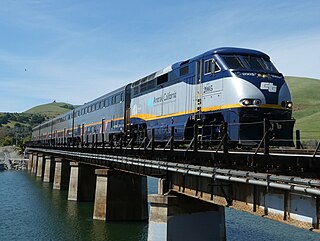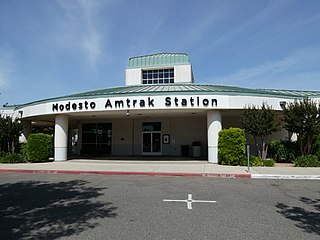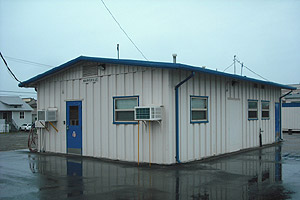
The Capitol Corridor is a 168-mile (270 km) passenger train route in Northern California operated by Amtrak between San Jose, in the Bay Area, and Auburn, in the Sacramento Valley. The route is named after the two points most trains operate between, San Jose and Sacramento. The route runs roughly parallel to I-880 and I-80. Some limited trips run between Oakland and San Jose. A single daily round trip runs between San Jose and Auburn, in the foothills of the Sierra Nevada. Capitol Corridor trains started in 1991.

The San Joaquins is a passenger train service operated by Amtrak in California's San Joaquin Valley. Seven daily round trips run between its southern terminus at Bakersfield and Stockton, with onward service to Sacramento and Oakland. For Fiscal year 2025, two additional trips to Sacramento will be added.

The Coast Starlight is a long-distance passenger train operated by Amtrak on the West Coast of the United States between Seattle and Los Angeles via Portland and the San Francisco Bay Area. The train, which has operated continuously since Amtrak's formation in 1971, was the first to offer direct service between Seattle and Los Angeles. Its name is a combination of two prior Southern Pacific (SP) trains, the Coast Daylight and the Starlight.

Richmond station is an Amtrak intercity rail and Bay Area Rapid Transit (BART) station located in downtown Richmond, California. Richmond is the north terminus of BART service on the Orange Line and Red Line; it is a stop for Amtrak's Capitol Corridor, San Joaquins, and California Zephyr routes. The accessible station has one island platform for the two BART tracks, with a second island platform serving two of the three tracks of the Union Pacific Railroad Martinez Subdivision for Amtrak trains. It is one of two transfer points between BART and Amtrak, along with Oakland Coliseum station.

Emeryville station is an Amtrak station in Emeryville, California, United States. The station is served by the California Zephyr, Capitol Corridor, Coast Starlight, and San Joaquins. The station is the primary connection point for Amtrak Thruway buses serving San Francisco.

16th Street station is a former Southern Pacific Railroad station in the Prescott neighborhood of Oakland, California, United States. The Beaux-Arts building was designed by architect Jarvis Hunt, a preeminent railroad station architect, and opened in 1912. The station has not been served by trains since 1994.

The station complex of Amtrak's Oakland Coliseum station and Bay Area Rapid Transit (BART)'s Coliseum station is located in the East Oakland area of Oakland, California, United States. The two stations, located about 600 feet (180 m) apart, are connected to each other and to the Oakland Coliseum/Oakland Arena sports complex with an accessible pedestrian bridge. The BART station is served by the Orange, Green, and Blue lines; the Amtrak station is served by the Capitol Corridor service.

Sacramento Valley Station is an Amtrak railway station in the city of Sacramento, California, at 401 I Street on the corner of Fifth Street, built in 1926 on the site of China Slough. It is the thirteenth busiest Amtrak station in the country, and the second busiest in the Western United States. It is served by four different Amtrak train routes and connecting Amtrak Thruway motorcoaches. It is also the western terminus for the Gold Line of the SacRT light rail system and the Route 30 bus serving California State University, Sacramento.

Davis station is a train station in Davis, California. The station is owned by the city, while the tracks are owned by the Union Pacific Railroad. The station is served by Amtrak California Zephyr, Capitol Corridor, and Coast Starlight trains. It is the primary stop for UC Davis and one of the busiest train stations in the region, serving over 10% of the total Capitol Corridor ridership.

Oakland–Jack London Square station is a train station in Jack London Square of Oakland, California, United States. The station is served by Amtrak's Capitol Corridor, Coast Starlight, and San Joaquins trains. It is officially named Oakland–Jack London Square/C. L. Dellums Station after C. L. Dellums, co-founder of the Brotherhood of Sleeping Car Porters; a statue of Dellums stands outside the station.

Auburn station is an Amtrak station in Auburn, California. Located at the corner of Nevada Street and Fulweiler Street, it serves as the northern terminus of the Capitol Corridor line. The station is not staffed. The platform is next to a short spur track off Track 2 of Union Pacific Railroad's route over Donner Pass. Because of the geography of the city, the Union Pacific's mainline tracks are split, with Track 1 running through the eastern side of the city and Track 2 crossing the western side of the city. The California Zephyr bypasses the city on its route between Roseville and Colfax primarily via Track 1. Auburn became a stop on Amtrak's Capitol Corridor in January 1998.

Martinez station is an Amtrak passenger train station in Martinez, California, United States. Located at the west end of downtown Martinez, the station has one side platform and one island platform, which serve three of the four tracks of the Union Pacific Railroad Martinez Subdivision. It is served by the daily California Zephyr and Coast Starlight long-distance trains, five daily round trips of the San Joaquin corridor service, and fifteen daily round trips of the Capitol Corridor service. Martinez is also served by Amtrak Thruway buses plus County Connection, Tri-Delta Transit, and WestCAT local buses.

Suisun–Fairfield station is an Amtrak station in Suisun City, California. It serves both Suisun City and nearby Fairfield. It is served by the Amtrak Capitol Corridor commuter rail line between Auburn and San Jose through Oakland.

Colfax station is an Amtrak train station in Colfax, California. Served by the California Zephyr, it is unstaffed. The station was built in 1905 by the Southern Pacific Railroad and was restored in the early 21st century; in addition to a waiting room, the building also houses the Colfax Heritage Museum. The platform is movable to accommodate Union Pacific rotary snowplows, which are liable to scrape a platform eight inches above top of rail.

The Martinez subdivision is a Union Pacific railway line which runs from Roseville, California to Oakland, California. It is informally referred to as the Cal-P line, after the original California Pacific Railroad, who constructed the line from Sacramento to Suisun and Fairfield. The line is entirely double-tracked including bridges, and features extensive sidings.

Modesto station is a staffed Amtrak station in Modesto, California. It is served by the San Joaquins service. Designed by Pacific Design Associates of Modesto and VBN Architects of Oakland, the $2.4 million depot was built on four acres of former dairy pastureland. The station has one platform which serves a single track.

Orland was a Southern Pacific Railroad station in Orland, California. The Northern Railway built the line out from Colusa County to Orland, opening for traffic on July 31, 1882. The railroad had assumed management of the town site a few years earlier. The Klamath served the station as late as 1954, and ran between Portland and Oakland, but the stop did not appear in the 1966 timetables. After Amtrak took over nationwide passenger operations, the state lobbied the company in 1974 to add the station as a stop on the Coast Starlight route, running daily from Los Angeles to Seattle. While the station saw service for a time, it was bypassed in 1982. The station building was subsequently moved to Glenn County Fairgrounds.

The California Zephyr is a long-distance passenger train operated by Amtrak between Chicago and the San Francisco Bay Area, via Omaha, Denver, Salt Lake City, and Reno. At 2,438 miles (3,924 km), it is Amtrak's longest daily route, and second-longest overall after the Texas Eagle's triweekly continuation from San Antonio to Los Angeles, with travel time between the termini taking approximately 511⁄2 hours. Amtrak claims the route as one of its most scenic, with views of the upper Colorado River valley in the Rocky Mountains, and the Sierra Nevada. The modern train is the second iteration of a train named California Zephyr; the original train was privately operated and ran on a different route through Nevada and California.

Marysville station was the last passenger rail station to operate in Marysville, California.




















